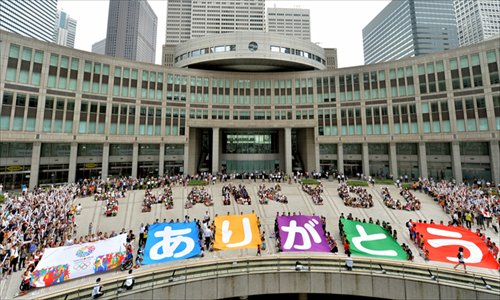Japan eyes Games windfall

People spell out the words "THANK YOU" at the Tokyo Metropolitan Government on Sunday, after Tokyo won its bid to be the host city of the 2020 Olympics. Tokyo won the right to host the Games for the second time, overcoming fears about radiation from the stricken Fukushima nuclear plant to land the 2020 edition of the world's biggest sporting event. Photo: AFP
Tokyo was awarded the right to host the 2020 Olympic Games on Saturday in Buenos Aires, with analysts believing that the victory is expected to boost Shinzo Abe's popularity and urging Japan to adjust its attitude on history to reflect its appreciation for peace as implied in the Olympic Spirit.
The Japanese capital will be the first Asian city to host the Olympics twice, having also hosted the 1964 Games.
Japanese Prime Minister Abe, who left early from a Group of 20 summit in Russia to make his pitch at the meeting in Buenos Aires, said he was overjoyed at the result and that he hoped that "hosting the Olympics will act as a trigger for breaking with a shrinking economy that has been hit by deflation for the past 15 years."
The good news sent thousands of Japanese into joyful celebrations on Sunday as Japanese media rushed to make positive forecasts.
Quoting projections from a research institute, Kyodo News predicted that the 2020 Games in Tokyo will likely push up Japan's gross domestic product by 0.5 percent that year with positive economic effects worth 4.2 trillion yen ($42.3 billion), due partly to expected growing demand for new construction and a boost to tourism.
The news agency also estimated that 8.5 million tourists will visit Tokyo during the Games and the spillover effects will add 2.96 trillion yen to the Japanese economy in the eight years from 2013.
"The successful bid to host the Games is a boost to Japan's morale as the country struggles to overcome the devastating earthquake, tsunami and nuclear accident as well as recover from its sluggish economy," Xu Jiaju, a professor of Japanese Studies with China Foreign Affairs University, told the Global Times.
Abe also told a Japanese TV program that the Olympics will definitely be a plus for growth as it will work as "the fourth arrow" of 'Abenomics', with the other three arrows being a massive fiscal stimulus, more aggressive monetary easing from the Bank of Japan, and structural reforms to boost Japan's competitiveness.
"It's a bit of a stretch to say the bid is a part of Abenomics. However, hosting the Olympics will stimulate consumption and help combat economic contraction," said Xu, adding that the positive economic predictions will also boost Abe's popularity.
Naoki Inose, Tokyo's governor, said by hosting the 2020 Tokyo Games, the country will create hope.
"We will offer dreams and hope to future generations and our hosting of the Games will accelerate the recovery of Japan's tsunami-affected area ... We will promote the Olympic Movement globally in an effort to create a 'peaceful and better world,'" said Inose, referring to the mission of the Olympic Spirit, which seeks to instill and develop the ideals of tolerance and understanding as well as making the world a more peaceful place.
Analysts, however, felt that Japan's stance on its history has struck a different tone as it continues to turn a blind eye to its history of aggression, triggering strong condemnation from neighboring countries.
On August 15, the 68th anniversary of Japan's surrender in World War II, three Japanese cabinet members and 89 lawmakers visited the Yasukuni Shrine, which honors Class-A war criminals. Furthermore, Abe, when addressing the anniversary, avoided words such as "profound remorse" and "sincere mourning" used by his predecessors and mentioned nothing about "pledging not to fight a war."
"We want to congratulate Tokyo for its successful bid of the Games. We also hope that the Games can bring real changes to the country, driving it to reflect on its history of aggression and truly appreciate the value of peace," Yu Zhirong, a research fellow with the Shanghai Japan Studies Center, told the Global Times.
Tokyo is planning to incorporate existing venues and has estimated a non-Games budget of around $4.4 billion compared to $3.4 billion for the actual event.
Agencies contributed to this story